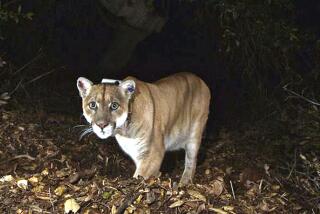Your Trash Can Put Wildlife in Danger
- Share via
I confess having no affection for coyotes, opossums, skunks, raccoons or even graceful mountain lions. Then again, I have a hard time building up animosity toward the creatures.
And I certainly wouldn’t want to harm them out of my own stupidity.
But that’s what many of us are doing--and we don’t even know it.
Today’s column is dedicated to making Orange County a safer place for wild animals, because many people care greatly about their welfare.
One of biggest threats they face: our trash.
“Every time you put out your garbage or recyclables you can harm wildlife,” said Dr. Pat Klein, wildlife veterinarian for the Humane Society of the United States.
Trash cans and recycling bins can be a death trap for wild animals, which can easily get their heads stuck in all kinds of glass and plastic food containers, and may suffocate. Raccoons, squirrels and even foxes have been found trapped in food containers, and young skunks are especially vulnerable to yogurt containers with narrow openings.
The plastic six-pack rings for beer and soft drinks are notorious for killing birds and, in the ocean, ensnaring sea life. And plastic wrap can be ingested by birds and animals who mistake it for food.
To make consumers aware of the danger posed by food containers and other packaging, the Humane Society is launching a national “Don’t Trash Wildlife” campaign this spring, including a poster you can get free of charge (to order one, go to the Web site https://www.hsus.org).
“We need to educate people that everything we do impacts the animals’ world,” said Debra Clarke, outreach coordinator for the Irvine-based Nature Conservancy.
For example, she said, some wild animals, especially skunks, are crazy about barbecue sauce: “They’ll jump right up on a hot grill and knock it over to get to the barbecue.”
The Humane Society offers some common-sense tips for trash handling:
* Rinse and Recycle. Rinse all glass or plastic containers to remove leftover food and the food smell. Remember, any container can be a danger.
* Cut or Crush. Cut up or crush plastic containers before you put them in your garbage or recycling bin. Completely cut apart plastic six-pack rings.
I’ve never gone to the trouble of snipping those plastic rings, and I told Clarke I didn’t know anyone who did. “I do,” she said.
* Close and Cover. Make sure non-recyclable food containers and plastic wrap are rinsed and secured inside a closed garbage bag. Never throw plastic packaging in an open trash can. For extra caution, cover your trash containers.
The Nature Conservancy puts out a color brochure to help people better understand living in harmony with wildlife. Clarke said it’s aimed at those who live on the periphery of the wildlife world in Orange County.
But really, that’s about anywhere. I live near Disneyland, and my neighborhood is infested with opossums. Huntington Beach residents constantly find skunks in their swimming pools. And a friend of mine who lives in urban Irvine says he sees coyotes roaming the streets.
And all of them are looking for our trash.
*
Jerry Hicks’ column appears Monday and Thursday. Readers may reach Hicks by calling (714) 966-7789 or e-mail to jerry.hicks@latimes.com


